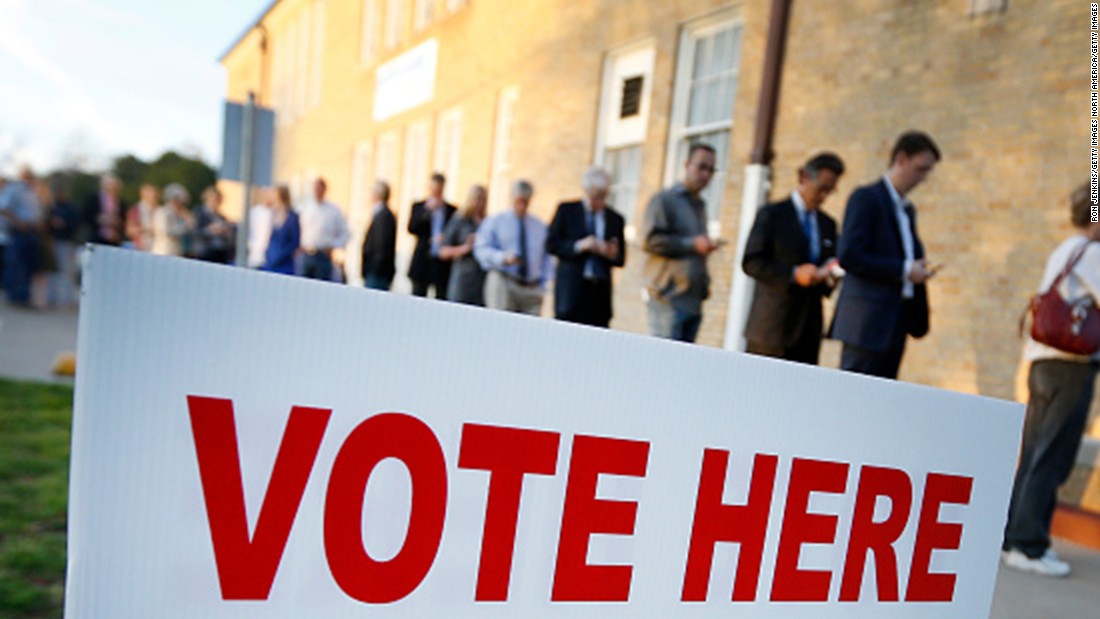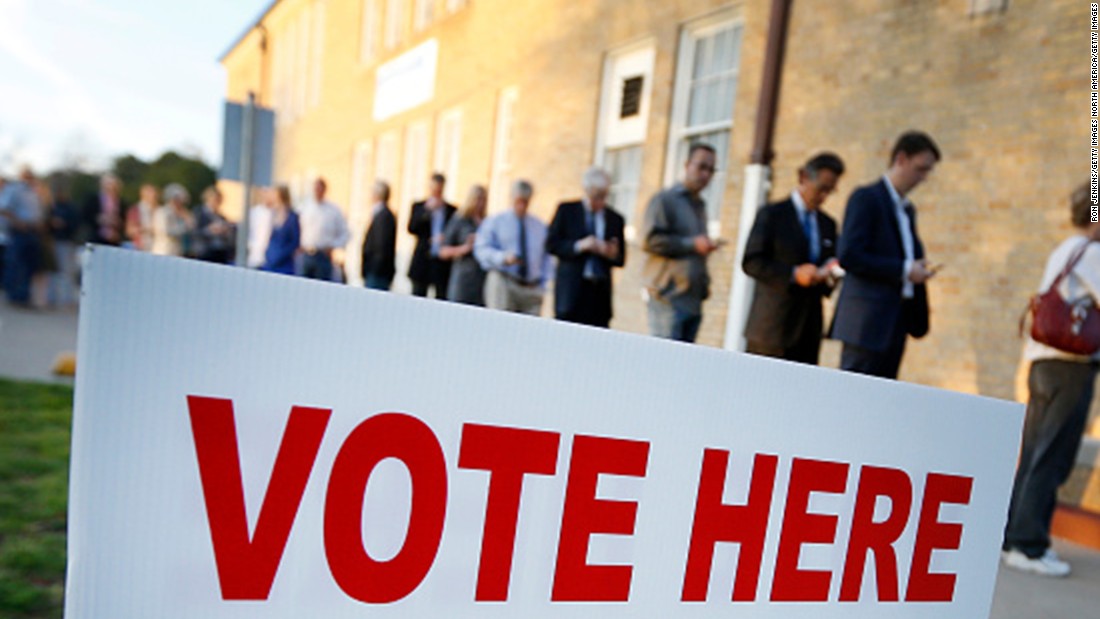Key ballot measures: The important, the fascinating and the weird

Washington (CNN)From minimum wage to pot to labor laws, voters in states around the country are engaging in direct democracy.
Several states are considering similar ballot initiatives with regard to firearms, marijuana and cigarettes.
The issues are in voters’ hands. Here are some of the biggest initiatives to watch, and we’ll keep you updated as results come in:
Guns
The gun debate usually focuses on the federal government, where Congress has rejected any and all measures related to gun control and where President Barack Obama has issued a series of controversial executive orders. But there’s plenty of movement on the issue at the state level.
California‘s Proposition 63 would put in place a raft of gun control rules, including a background check system for purchasing ammunition.
Maine‘s Question 3 addresses background checks for purchasing or transferring firearms.
Nevada‘s Question 1 would make it so people can’t sell or transfer firearms to one another without a licensed dealer conducting a federal background check.
Washington‘s Initiative No. 1491 would allow courts to issue temporary orders at the request of police, family or household members to prevent people “exhibiting mental illness, violent or other behavior indicating they may harm themselves or others” from having access to guns.
Minimum Wage
Raising the minimum wage has become a focal point for progressives in the US. The “fight for 15” in particular has taken hold. These states don’t have $15 minimum wages on their ballots, but voters will decided whether to raise rates by the year 2020.
Arizona‘s Proposition 206: The minimum hourly wage will go from its current $8.05 to $12 by 2020 and employees will get paid sick time.
Colorado‘s Amendment 70: This would raise the minimum wage from $8.31 to $12 by the year 2020.
Maine‘s Question 4: Proposes raising the minimum wage from $7.50 to $12 by 2020 and ties it to the cost of living from then on.
Washington‘s Initiative 1433: The minimum wage increases to $13.50 by 2020.
Pot
Following in the footsteps of Colorado, Oregon and Washington, more states are looking to legalize marijuana for recreational use. Still other states are looking to approve it for medical purposes.
Arizona‘s Proposition 205 would create the Department of Marijuana Licenses and Control and allow for the recreational use of marijuana for people 21 and over.
Arkansas‘ Ballot Issues 6 and 7: Both of these issues would allow for medical marijuana in the state of Arkansas. Issue 6 is an amendment to the state’s constitution, and Issue 7 is the passage of an act. An amendment is far more difficult to reverse, whereas the state legislature could dismantle the Arkansas Medical Cannabis Act should it choose to do so.
California‘s Proposition 64 would make recreational marijuana legal for those 21 and older. House Minority Leader Rep. Nancy Pelosi has backed this measure.
Florida‘s Proposed Constitutional Amendment No. 2 allows the use of medical marijuana for “debilitating” conditions.
Maine‘s Question 1 makes marijuana legal for people 21 and older, with the product subject to state regulation.
Massachusetts‘ Question 4 allows for recreational use of pot for people 21 and older.
Montana‘s Initiative No. 182 legalizes marijuana for medical purposes as prescribed by a physician.
Nevada‘s Question No. 2 allows for the recreational use of pot for people 21 and older.
North Dakota‘s Initiated Statutory Measure No. 5 legalizes the use of medical marijuana.
Death penalty
Once banned, then brought back, the death penalty now exists in a piecemeal fashion with executions a reality or a thing of the past, depending on the state. More recently, states have had difficulty imposing the penalty simply because they cannot obtain the drugs required to kill a person by lethal injection. Here’s the action on this issue:
California‘s Proposition 62 repeals the death penalty, while Proposition 66 changes rules around the legal system regarding the death penalty, with the intent of speeding up the time line from conviction to execution.
Nebraska‘s Referendum No. 426 allows voters decide whether to “retain” or “repeal” an act passed by the Nebraska Legislature eliminating the death penalty. Voting in favor of the referendum is a vote against the death penalty. A vote to “repeal” is a vote for the death penalty. The wealthy governor of this state, Gov. Pete Ricketts, has personally invested his own money into the campaign to keep the death penalty.
Oklahoma‘s State Question No. 776 increases the state’s options for execution to potentially any method “not prohibited” by the US Constitution. Given the difficulty states are having securing lethal drugs, Oklahoma is trying to see if it can expand its options for execution.
Health care
Progressives are spearheading major initiatives in health care, pitting their organizing power against, principally, the pharmaceutical industry.
California‘sProposition 61 would make it so no state agency could buy prescription drugs for anything more than “the lowest price paid for the same drug by the United States Department of Veterans Affairs.” There’s a lot going on with this proposition, but one thing to keep in mind for everyone is that it could represent the extent to which Vermont Sen. Bernie Sanders’ “political revolution” has influence. Sanders personally supports this measure and has gone to California on its behalf. If it passes, it is a loss for the pharmaceutical industry and a win for Sanders-world.
Colorado‘s Amendment 69 establishes a state-run health care system, dubbed “Coloradocare.” Approval of Coloradocare would amount to a major transformation for Colorado state government to say the least. Additionally, the Centennial State’s Proposition 106 would allow “any mentally capable adult Colorado resident” who has been diagnosed with a terminal illness to get access to drugs to end his or her life.
Campaign finance
Legal challenges at all levels, new machinations from lawyers and the composition of the Federal Election Commission have all combined to allow more money in our political process. With this being seen as increased free speech to some and in-kind corruption to others, a few states are looking at creating their own campaign finance rules.
Missouri‘s Constitutional Amendment 2 would, among other things, would “establish limits on campaign contributions” for state and judicial candidates. Should this pass, Missouri would be offering a wholly different model from federal campaigns. On the federal level, campaign contribution limits have been repeatedly thrown out by the Supreme Court of the United States.
South Dakota‘s Initiated Measure 22 would create the option for publicly financed campaigns.
Washington‘s Initiatives 735 and 1464 are both campaign finance measures. 735 tells the legislature to propose an amendment to the US Constitution declaring that corporations do not have constitutional rights and that free speech “excludes the spending of money.” 1464 would create a public financing system for campaigns.
Cigarettes
The price per pack could go up a bit in several states should ballot measures pass. The tax increases on tobacco products could discourage people from smoking and increase state revenues by taxing the minority of their populations who do smoke.
California‘s Proposition 56 would raise taxes on cigarettes by $2 a pack. The measure says the revenues would exceed $1 billion in 2017-2018 and go to health care and tobacco control programs.
Colorado‘s Proposed Initiative 143 would raise taxes on cigarettes by $1.75 a pack. The measure says the revenues would go to health care and tobacco control programs.
Missouri‘s Constitutional Amendment No. 3 would raise taxes on cigarettes by 2020 by 60 cents per pack and on tobacco wholesalers by 67 cents per pack. The revenues would go into a fund for child education and health.
North Dakota‘s Initiated Statutory Measure No. 4 would raise taxes on cigarettes to $2.20 a pack. The money would go to the state, a veterans’ fund and a community health fund.
Other ballot measures of note
Alabama budget: Alabama’s proposed Amendment 14 is an attempt to avoid a potentially huge issue for Alabama at all levels of government. The gist of it is that voters passed an amendment decades ago that requires the legislature to vote on its budget before everything else. The legislature has gotten around that by first voting on a resolution to bypass the rule and vote on other things before the budget. Many of these votes have passed with only a handful of legislators agreeing to bypass the budget rule. This has gone on for a long time and potentially hundreds of laws have been passed this way. Jump to current day Alabama where a judge ruled one of these laws was invalid. If this amendment goes through, that judge’s ruling no longer stands, things continue as they are and all these local rules stay in place. If this amendment fails, it could bring about the end of all these rules built over decades and force the legislature to focus first on its budget.
Leaving Arkansas: Currently, when the governor of Arkansas goes to another state or country, he or she is no longer effectively the governor, and the lieutenant governor assumes authority. If Arkansas’ Ballot Issue No. 2 passes, the governor stays fully in power even when he or she is outside of the state. The existing rule was written well before modern communications technology.
Criminal justice in California and Oklahoma: California’s Proposition 57 could make it easier for “nonviolent” offenders to get out early on parole. Oklahoma’s State Question No. 780 would lessen some property and drug crimes from felonies to misdemeanors.
DC statehood: The nation’s capital has long pushed to become its own state, and 2016 will be no different. Advisory Referendum B expresses the will of voters of DC for the city council to petition Congress to make DC its own state, called “the State of New Columbia.”
Georgia’s failing schools: Amendment 1 would allow the state’s General Assembly to take over a failing school district via the creation of an “Opportunity School District.” The proposal, backed by Gov. Nathan Deal, has been the subject of much debate following years of clashes between failing local schools and state and county governments. Deal managed to make matters harder for his side when he said Amendment 1 would help “colored people,” a comment he later called a misstatement.
Right to hunt in Indiana and Kansas: The only public question on the ballot in both Indiana and Kansas would amend each state’s constitution to provide a constitutional right to “hunt, fish and harvest wildlife.”
Voting reform in Maine: Maine’s Question 5 establishes a new voting system allowing people to “rank their choices.” This state has an outsized number of independent political candidates, and this rule could make things easier for those who wish to vote outside of the Democratic and Republican parties.
Big business in Oregon: Oregon’s Measure 97 increases taxes on businesses when “sales exceed $25 million.”
Organize (or not) in South Dakota and Virginia: South Dakota’s Initiated Measure 23 allows unions to charge nonmembers fees. South Dakota is currently a right-to-work state, and this rule would strengthen labor unions there. Virginia’s Question 1 would create a constitutional amendment banning union-only workplaces. Virginia is already a right-to-work state, so this measure would codify right-to-work into the state constitution, making it harder to repeal in the future.
Green Washington: Washington state’s Initiated Measure No. 732 creates a carbon emission tax, while its Advisory Vote No. 15 allows voters to repeal or maintain a tax exemption for alternative-fuel vehicles.
Beyond the states, at the city level some voters are also being asked for their views. People in these 4 cities will have their say on the “soda tax.”
Read more: http://www.cnn.com/2016/11/08/politics/key-ballot-measures-2016-election/index.html
